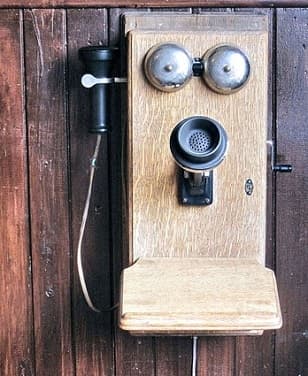The invention of the telephone was not a single story.
I wanted to do a newsletter on Alexander Graham Bell because I understood he was a kind, caring man as well as a great inventor. As I’ve learned more about him that impression hasn’t changed.
However, there’s more to the story of the telephone than what I remember learning in school: more controversy, more complications, and more heroes, even though some felt cheated by the others.
So, in this newsletter, I’ve ended up linking to several articles about the history of the telephone and its inventors. The first gives a summary of the invention and development of the telephone, the ways it changed the world, and some entertaining early predictions about it.
(You might want to skim the section on Development after the first paragraph—it gives a lot of dates and details. The section on World Changes is worth reading.) I was fascinated by this observation: “In
the late 19th century, people raved about the telephone's positive aspects” and worried about expected problems. Those anticipations and worries “mirror nearly precisely what was later predicted about the impact of the internet.”
PBS has a very short biography of Alexander Graham Bell with a couple of interesting quotes at the end. Thought Co. also has a biography of him, and of two of the others who invented telephones.
However, I’m recommending their discussion of Antonio Meucci , who claimed to be the first to develop a working telephone. He filed a ‘caveat’ at the Patent Office well before Bell’s work, but he let it expire (possibly due to lack of funds) so that Bell was the first to file an actual patent.
(Remarkably, Elisha Gray applied for a patent on his phone model
later that same day. See links to articles about him, as well as several about Bell, at the bottom of the page, if you want to know more.)
The author makes a persuasive argument that Bell did not steal Meucci’s ideas, as Meucci claimed. There’s clear evidence that all three men were fascinated by science and were intelligent, hard-working inventors. It seems they independently realized the implications of the telegraph and other contemporary science discoveries which led them to similar ideas for a way to transmit voices along a wire.
It’d be an interesting project for a student or class fascinated by inventions to compare their work and consider the rights and wrongs of patents and privilege. (Bell had the advantage of wealthy friends and associates who could fund his ideas and set up a company to quickly scale telephone production and connections.)
Finally, if you’re interested in a visual history of telephones, Slate has a great slide show. It won’t give you much English practice, but it does give a sense of the gradual changes in phone design.

Vocabulary Explanations
device- an object (often electrical or electronic, like a telephone) made for a certain use.
domestic- related to the home—or to a nation’s own production rather for export
monopoly- a company allowed by the government to have exclusive rights to sell a product or service, preventing other companies from competing with it.
A patent—the right to develop and sell a product idea for a limited time without competition. Governments issue (or grant) patents to encourage inventors to spend the time and money to develop new ideas without fear that others could use those ideas to immediately make similar products before the inventors themselves have had a chance to benefit from their inventions. Usually once a patent has been filed (registered with the Patent Office) and the fees paid, no one else can file a patent for a closely related idea.
Early telephone operators used switchboards to
direct calls to the correct recipient (the person receiving the call.)
Warmly,
Catherine Simonton, EnglishHints.com
P.S. If you don’t like to open links in emails, you can go to the EnglishHinks Back Issues page and open them there. It’s https://www.englishhints.com/English_Detective-backissues.html
A note if you get gmail: Have you missed any issues of English Detective? if you find English Detective in your Promotions box, you can move it to your Primary box (if you want) by clicking on it and dragging it there, then clicking Yes when asked if you want to always get it in the Primary box.
If you are not already getting English Detective, you can subscribe by completing the form
here. (It's free!)
Also, you can reach me by mail at 1752 Driftwood Drive, El Centro, CA 92243, USA.
|

